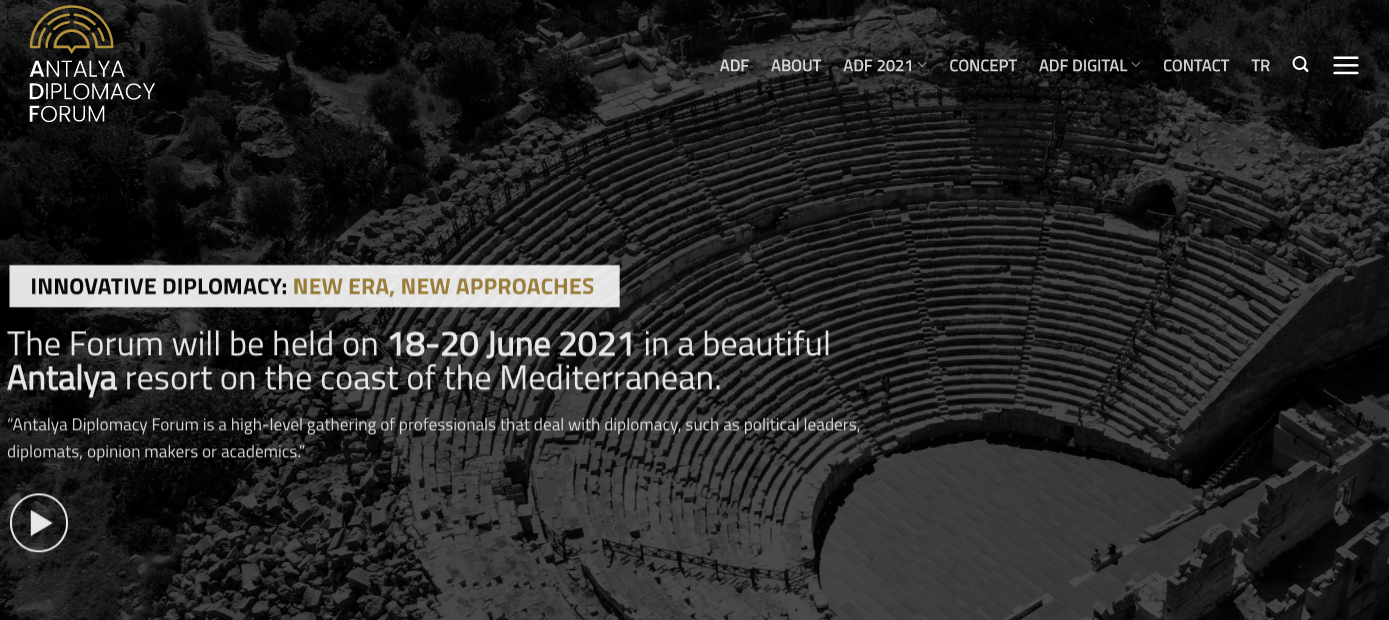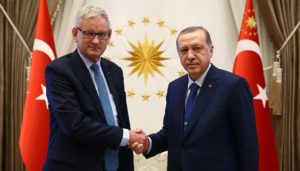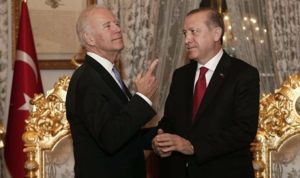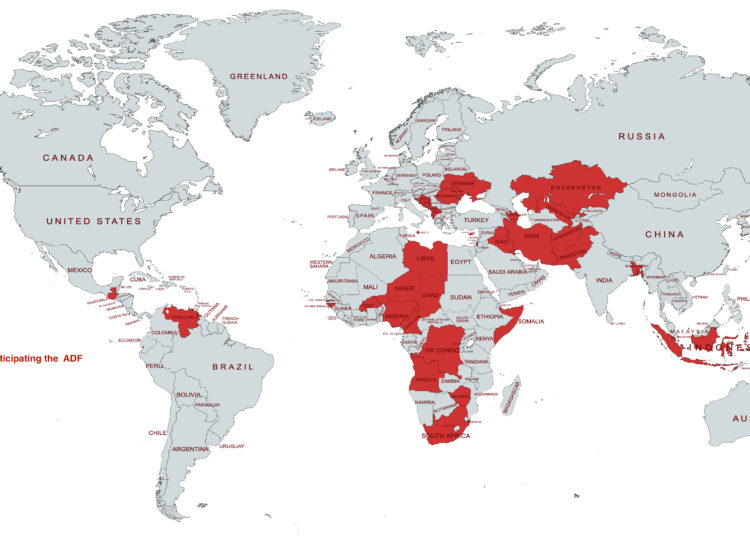Levent Kenez/Stockholm
Turkey will host an international forum on diplomacy June 18-20 in the Mediterranean resort city of Antalya whose keynote speaker is Turkish President Recep Tayyip Erdoğan, with the participation of world leaders and top diplomats. However, few countries are officially participating in the event, demonstrating the isolation of Turkey from its Western allies and key global actors in foreign policy.
Announced with great expectations by the Presidency’s Directorate of Communications two years ago, the Antalya Diplomacy Forum (ADF) is a series of panel discussions that aim to serve as an “excellent” platform for regional and global actors. The first meeting planned in 2020 had to be postponed due to the outbreak of COVID-19. Despite the organizers’ expectations of a high-level gathering of political leaders, diplomats, opinion makers and academics, the first year event, titled “Innovative Diplomacy: New Era, New Approaches,” looks like it won’t be as well attended or significant as desired.

So far, the 36 countries whose representatives are officially participating in the ADF are mostly from Africa and Asia. The 11 countries from Europe are Malta, Kosovo, Montenegro, Bosnia and Herzegovina, Croatia, North Macedonia, Albania, Moldova, Ukraine, Romania, and the Turkish Republic of Northern Cyprus (KKTC), a state recognized only by Turkey. Apparently none of the major world powers such as the US, Russia, China, Germany, France, the UK and Japan have announced their participation. There are also no representatives from Egypt or Saudi Arabia, two important decision makers in the Arab world with which the Erdoğan government is seeking ways to normalize relations after a years-long rift. There are ex-leaders, former ministers and retired politicians from various countries, giving the impression that Antalya is more attractive than diplomacy.
Turkey withdrew the invitation extended to Israeli Energy Minister Yuval Steinitz following “Israeli mistreatment of the Palestinians” in May, according to the state-run Anadolu news agency. It would have been the first high-level visit to Turkey by an Israeli official since 2010, if Steinizt had participated.
It is no surprise that Carl Bildt, Sweden’s former premier and foreign minister and a good friend of Erdoğan, is among the participants.

There are several reasons why the event has received little attention up until now. A country such as Turkey, which has simultaneous diplomatic problems with the US, Russia, the European Union, Egypt, Saudi Arabia and neighboring countries, does not sound like an ideal place to discuss the future of diplomacy.
It is no secret that US President Joe Biden and Erdoğan don’t get along well. Unhappy with former president Donald Trump’s defeat in the last election, Erdoğan said troubled relations between Turkey and the US had sunk to a new low after Biden formally recognized the Armenian genocide in April. Moreover, the US officially announced it had excluded Turkey from the F-35 fighter jet production program last month because Ankara had purchased a Russian S-400 missile system. Erdoğan will meet with Biden for the first time since the US election on June 14 during a NATO summit in Brussels. On Tuesday Erdoğan praised bilateral relations during the Trump era, implying his cold relationship with Biden.
The European Union is reluctant to resume accession negotiations with Turkey due to its abysmal human rights record. The only area of cooperation is migration, with Turkey willing to keep refugees in its territory in return for financial compensation. That’s why several bureaucrats from the EU including Josep Borrell-Fontelles, the EU high representative and vice president of the EU Commission, and Oliver Varhelyi, the EU commissioner for neighborhood and enlargement, have announced their participation in the ADF. The refusal to abide by European Court of Human Rights’ rulings is another problematic issue between Turkey and the EU.
Last week Russia warned Turkey once again against Ankara’s efforts to boost cooperation with Kyiv. In an interview with the Argumenty i Fakty newspaper, Russian Foreign Minister Sergey Lavrov said, “We strongly recommend that our Turkish colleagues carefully analyze the situation and stop fueling Kyiv’s militaristic sentiment,” which could be interpreted as a threat. However, Turkey and Poland signed a deal for the sale of 24 Bayraktar TB2s, making Poland the first NATO and European Union member country to purchase Turkish drones, another move that will disturb Russia.
Turkey has just begun attempting to normalize relations with Egypt and Saudi Arabia. Both countries imply that Erdoğan should prove his sincerity and give concessions such as withdrawing his open support for the Muslim Brotherhood, which is listed as a terrorist organization by Egypt, Saudi Arabia, the United Arab Emirates and some of the other Gulf states.
Another reason for the lack of interest in the event is whether COVID restrictions will allow for a safe gathering and safe travel. Many countries have halted flights to and from Turkey given the fact that Turkey is one of the countries worst affected by COVID, with the highest infection rate in Europe. Many counties in the EU have announced that passengers coming from Turkey are required to quarantine in a designated location. European football’s governing body UEFA ruled to move the Champions League final on May 29 from Turkey to Portugal for the second year running. Moreover, the Formula One Turkish Grand Prix, scheduled for June 11-13, was canceled in view of several countries imposing travel restrictions to Turkey due to rising COVID-19 cases. Organizers of the ADF announced that all guests are requested to have the results of a valid PCR test conducted no more than 48 hours prior to their arrival in Turkey in addition to compulsory COVID tests in their hotels between 16:00- 24:00 every day, which is difficult to enforce with VIP guests.
Turkey also has lost its credibility on important issues in the eyes of the international community. For example, one of the panel discussions is titled “Women’s Contribution to the Search for Peace.” President Erdoğan issued an executive decree in March annulling Turkey’s ratification of the Convention on Preventing and Combating Violence against Women and Domestic Violence, better known as the Istanbul Convention. Ironically, Turkey was the first member state to ratify the CoE convention.

The forum is being coordinated by Ambassador Murat Karagöz, director general for information at the foreign ministry. Nordic Monitor previously published profiling documents sent by Karagöz to Ankara when he was ambassador to Jordan from 2016 to 2019 as part of the spying activities of Turkish diplomats abroad. Turkey’s foreign minister Mevlüt Çavuşoğlu, the host and one of the speakers at the event, said earlier that Turkish diplomats assigned to embassies and consulates have officially been instructed by the government to conduct such activities abroad. “If you look at the definition of a diplomat, it is clear. … Intelligence gathering is the duty of diplomats,” he said.
It should be noted that Antalya is Çavuşoğlu’s hometown.












